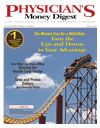Publication
Article
Balance Is Key to a Doctor's Financial Health
Author(s):
One of the toughest things wedoctors do is make importantdecisions with limited dataand, therefore, with some uncertainty.Unfortunately, this often unnecessarilycarries over into our investing habits.Everyone, even doctors, wants to makea killing in the stock market, and wethink it is just a matter of a hot tip topick the next Google. Luckily, wisdomoften comes with age. Over the years,the loose conversation I used to hearfrom other doctors about this or that"can't miss" investment opportunityhas given way to talk of portfolios anddiversification.
The Itch to Risk Big
I guess each of us has some sad, privatetale to tell of the "one that gotaway." If these unfortunate investingdisasters relieved us of the notion thatwe should be pouring our hard-wonHMO earnings into potential homerunstocks, it might have been a good,if expensive, lesson. Why? We intuitivelyrecognize that no gain is perceivedas balancing the pain of anequal loss. That being said, the necessityof saving and growing our nest eggsreally does require some kind ofaction, even if it's risky.
It might be comforting to keep inmind what Jack Kennedy once said,"There are risks and costs to a programof action. But they are far lessthan the long range risks and costs ofcomfortable inaction."
The Boring & Brilliant Truth
The trick of a successful investmentstrategy for most doctors is not tomake the occasional big gain, butrather diversifying to make reasonablegains and avoid making the big loss. Ifyou do the math, the time required tomake up for a single losing year is farlonger than expected, if possible at all.Time and money do correlate in investingjust as in a doctor's office schedule.An opportunity lost to gain, even asmall gain, is lost. And you have toprotect your investable asset base tohave any opportunity for futurereturns of whatever size.
Physician's
Money Digest
Because of my position at I am asked "What stockshould I buy?" And, invariably, peopleare disappointed when I cite the financialacademics who tell us that it doesn'tmatter as much what you buy as howyou buy. The people who over time dothe best as investors usually have a portfoliodiversified among different kindsof stocks or mutual funds and invest forthe long term.
After you read this month's featureon stocks, let me know whatyour interesting experiences havebeen and if they have altered youropinion on stock buying and sellingone way or the other. I am certainlywilling to listen and learn and shareany new insights.
